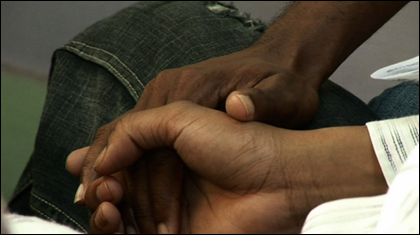We may be accustomed to thinking of AIDS as most rampant in distant parts of the world like Africa, India, and South Asia. But these days the epidemic is flaring up a bit closer to home, in the Caribbean. Indeed, AIDS is now the leading cause of death among adults there, and the Caribbean's rate of new infections is the second highest in the world, following just behind Sub-Saharan Africa.
A major factor in the region's susceptibility to the epidemic is its pervasive atmosphere of homophobia, which makes education and outreach efforts nearly impossible. Jamaica, which lies near the middle of the Caribbean and, as of last year, was found to have an astounding 32 percent HIV infection rate among gay men, offers a case study in how anti-gay attitudes have helped spread and intensify the epidemic's impact.
In Jamaica, homophobic attitudes are reflected in everything from laws that criminalize anal sex, to the lyrics of popular dancehall music that celebrates the murder of gay men, to widespread acts of anti-gay violence, and a gay culture of sexual secrecy and high-risk behavior. Each of these factors is intensified by a religious context that defines homosexuality as a mortal sin and points to the Bible for moral justification in violently rejecting the concerns of the gay community.
According to Dr. Robert Carr, widely recognized as one of the world's leading researchers on cultural forces and the unfolding of the AIDS pandemic, local awareness of the disease was initially shaped by the international media: "AIDS was seen as a disease of gay, White, North American men. And people were really afraid of it."
"There were no treatments available in the Caribbean at the time," he says, "so AIDS really was a death sentence. You had people with Kaposi's sarcoma, people with violent diarrhea, who were just wasting away and then dying in really horrible and traumatic ways." The terror induced by these deaths, combined with an already intense local culture of homophobia to produce a violent backlash. "To call what was going on here 'stigma and discrimination' was really an understatement," he says. "In the ghettos they were putting tires around people who had AIDS and lighting the tires on fire. They were killing gay people because they thought AIDS was contagious. It was a very extreme environment, and really horrible things were happening."
Jamaican male sexual identity, and Caribbean male identity more broadly, has long been defined in opposition to homosexuality. "A lot of Jamaican men, if you call them a homosexual, the term is "battyman," will immediately get violent," says Dr. Kingsley Ragashanti Stewart, a professor of anthropology at the University of the West Indies. "It's the worst insult you could give to a Jamaican man."
Dr. Stewart, who works with young men from the ghettos and himself grew up in a poor inner-city community, says that homophobia influences almost every aspect of life. It has even come to shape the everyday language of ghetto youth. "It's like if you say, 'Come back here,' they will say, 'No, no, no don't say 'come back'.' You have to say 'come forward,' because come back is implying that you're 'coming in the back,' which is how gay men have sex."
Dr. Stewart says that the word "fish," the current slang for "gay," has become so sexually charged that many young people say "sea-creature" to avoid any compromising linguistic associations. And young men from the ghettos will go to great lengths to avoid saying the number "two." "It's become associated with going to the toilet (as opposed to 'number one')," and hence, by an almost magical association, with homosexuality. The principal of a large public school in Kingston confirmed this phenomenon, noting that teaching mathematics is particularly problematic when the majority of students refuse to use one of the cardinal numbers.
Then there is the criminalization of the "abominable act of buggery," as anal sex is defined in Jamaican Law, and which is punishable with up to ten years hard labor. "The reality in Jamaica is that men who have sex with men, for fear of being prosecuted and being found guilty under the sodomy law, pretend that they're not gay," says Miriam Maluwa, the UNAIDS country representative for Jamaica, explaining how what she calls "legalized discrimination" has driven the HIV epidemic underground. "[Gay men] marry fairly rapidly, they have children fairly rapidly to regularize themselves, and that is really a ticking bomb. So we are really talking about this targeted group, having quite high levels of infections, which is interacting sexually with the general population."
Experts are increasingly convinced that getting AIDS under control here will require putting out not just general public health messages to the whole population, but targeted ones, directed at those most at risk. "A good starting point," Maluwa suggests, "would be to openly design programs [for the gay population], just like we have programs to address the general population, to address children." And these programs, she contends, should come complete with "adequate commodities, such as lubricants and condoms."
But the social and political environment makes such targeted public health assistance nearly impossible—in part because the gay community is afraid to come forward to receive it, and in part because the (frequently violent) intolerance gays face makes AIDS a relatively less pressing concern.
At AIDS Support For Life, a not-for-profit health and advocacy group based in Kingston, Jamaica's capital city, I spoke with staff and patients, including one handsome young gay Jamaican man in his early twenties who told me how his boyfriend was stabbed to death on the street for being gay – and how another close friend was locked inside his parents house by a crowed of homophobic neighbors and burned alive.
"If it were AIDS that were killing us," he said, "I would use a condom. But it's people, not AIDS, that is killing us. AIDS has nothing to do with it."
| Attachment | Size |
|---|---|
| 23.07 KB |
